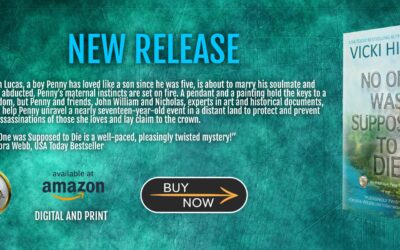Trust Your Instincts
By
Vicki Hinze
You’re walking out of a store with an armful of packages. You sense someone following you to your car. An internal alarm warns you of this. You glance around and don’t notice anyone suspicious, anyone that strikes you as dangerous. You shrug off the internal alarm, telling yourself you’re just overreacting, and you walk on. Just as you unlock your car, you’re attacked.
Later, you tell yourself, you knew something was off. You felt deep down something was wrong. Why didn’t you listen to your instincts? You’re filled with recrimination and regret.
What actually happened?
Depending on who you ask, you’ll get very different answers. A few are:
1. You are subconsciously more intensely aware of what you sense. Your subconscious notices everything, forgets nothing, and that instinctive warning is it firing off a heads up warning to your conscious mind. Because the subconscious doesn’t fire off all the details of what lead to the sounding of the alarm, you failed to trust the warning. Result: you suffered an attack and now suffer the consequences.
2. Your guardian angel attempted to protect you by whispering through your instincts that you were in danger. You didn’t listen, you doubted. Result: you suffered an attack and now suffer the consequences.
3. You didn’t trust your instincts. Whether the warning was a physical, emotional, or spiritual nudge, you lacked confidence in your instinctive reaction to it. You questioned not the warning but doubted your own judgment in responding to it. Result: you suffered an attack and now suffer the consequences.
Which means, regardless of who you ask, the problem comes down to one of trust and confidence and faith—in you. In your judgment. In your intuitive and instinctive reactions.
How you get from A (the warning) to B (reacting to the warning) is different for different people because people naturally react differently to everything. We’re all human, but we’re all individuals with our own skills and abilities, our own insights and experiences. We react in a way that is natural to us.
My point is, the process isn’t significant. What works for you, works for you. That’s significant. That your process works is what matters, and that you learn to trust your instincts matters most.
A Few Tips from the Journey…
-
If it sounds too good to be true, it probably is.
-
If it walks, talks and acts like a dud, it probably is.
-
If it feels wrong, it probably is.
-
If everyone says “go” but your gut says “no,” trust yourself. “Go” isn’t always one-size fits all. And often what’s right for others is wrong for you.
-
If something is too easy, too hard, too (choose your adjective), it might be fine but it also might not be the best. Keep investigating. Instincts warn us about the differences in good, better and best, too!
Bottom line. In life, we don’t get the scary sound effects that warn us danger is afoot, but we do get instinctive reactions. We get those warnings and we get that excited bubble in the gut when something is just plain right and we know it.
When we heed our instincts, we often later learn that we were right to do so. We don’t use instinctive reactions or intuitive feelings as an excuse, to avoid our fears, but as the tool they are. Instincts help guide and direct us. They are forged from the steel of experience and known results. They take into account all aspects of us, all that’s happened to us and all we know or have heard about—our life soup.
We should trust our instincts—the warnings and the affirmations. The more we tune into our instincts and they prove accurate, the more confidence we will have in them. But to get proven, we must give our instincts the opportunity to prove to us they’re right. More often than not, the gut knows…
_________________________________
© 2015, Vicki Hinze. Hinze is the award-winning, USA Today bestselling author of nearly thirty novels in a variety of genres including, suspense, mystery, thriller, and romantic or faith-affirming thrillers. Her latest release is The Marked Bride, Shadow Watchers, Book 1. She holds a MFA in Creative Writing and a Ph.D. in Philosophy, Theocentric Business and Ethics. Hinze’s online community: Facebook. Books. Twitter. Contact.www.vickihinze.com. Subscribe to Vicki’s Newsletter.







